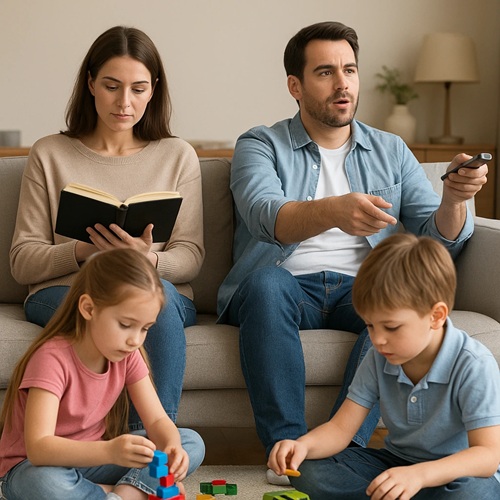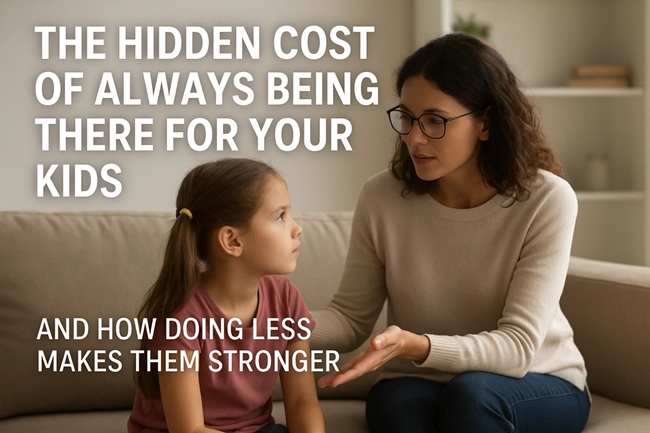The Moment That Changed How I See Parenting
A few months ago, my 8 year old son was trying to pour himself a glass of milk.
He tilted the carton just a little too much, and in the blink of an eye, the milk overflowed, onto his hands, the counter, and of course, the floor.
My instinct? Rush in, grab a cloth, clean everything up before he panics or cries.
But something made me pause.
Instead, I handed him the cloth and said, “It’s okay. Let’s clean it together.”
He didn’t cry, he didn’t get upset, he cleaned. And I realized, he didn’t actually need me to fix it, he needed me to let him handle it.
That was the moment I started rethinking what “being a good parent” really meant.

The Myth of Parenting : Being There for Everything
We’ve been told for years:
- Good parents are always available.
- Good parents drop everything for their kids.
- Good parents solve problems quickly so kids don’t struggle.
But here’s the hard truth, when we do too much, we unintentionally send a dangerous message:
“You can’t handle things on your own.”
Kids start believing they’re not capable. They stop trying. They lean on us for answers even when they’re perfectly capable of figuring things out.
It’s not love they’re missing, it’s the opportunity to grow.
When Help Becomes a Hindrance
Let’s be honest, it feels good to help.
You feel useful, Needed and Loved.
But over helping can have long term consequences:
1. Dependence Over Confidence
If you always tie your child’s shoelaces, they’ll never have to learn. And once they finally do, they’ll wonder why they ever thought it was so hard.
2. Poor Problem Solving Skills
Life is full of tiny challenges, homework confusion, lost toys, disagreements with friends. When we jump in every time, kids don’t develop the patience or creativity to solve problems themselves.
3. Fear of Failure
If a child never stumbles, the first big obstacle they face will feel terrifying. That fear can make them avoid trying new things altogether.
The Science: Why Struggle is Good
Child development experts talk about something called the “Zone of Proximal Development” It’s where the task is just hard enough that the child can succeed with effort.
When kids work in this zone, they:
- Strengthen problem solving pathways in the brain.
- Develop resilience, the ability to bounce back after setbacks.
- Build self trust, the belief that they can figure things out.
Small failures are like vaccines for life’s bigger challenges, they prepare kids for the real world without causing permanent damage.
Why Parents Need Personal Time Too
Here’s something we rarely admit out loud, we love our kids, but we also need a break from them.
It’s not selfish. It’s necessary.
1. Your Sanity Matters
A tired, overworked parent is not a patient parent. Personal time helps you recharge, so you can show up with more energy and warmth.
2. You’re a Role Model
Kids learn by watching. If they see you reading, painting, exercising, or socializing, they learn that adults have hobbies, boundaries, and lives beyond caregiving.
3. It Teaches Them Boundaries
When you say, “I’m reading for 30 minutes, and you can play until I’m done”, they learn patience and respect for others’ time.
How to Step Back Without Stepping Away
The idea isn’t to leave kids on their own for everything. It’s about creating safe spaces for independence.
Here’s how:
- Pause Before Helping
When they ask for help, instead of jumping in, say:
“What have you tried so far?”
This makes them think about their own solutions first.
- Give Choices, Not Solutions
Example: “You can look for the missing toy in your room or the living room. Which will you try first?” - Assign Real Responsibilities
Let your 8 year old pour their own milk or get those cookies to eat. Let your 12 year old make their own school lunch or pack it for themself. - Let Small Consequences Happen
If they forget homework once, let them explain to the teacher. It’s a lesson they’ll remember. - Schedule Your “Me Time” Without Guilt
Mark it on the calendar. Protect it. This shows your kids that your needs matter too.
A Personal Shift That Changed My Parenting
After the milk incident, I started stepping back more.
When my son forgot his sweater one morning, I didn’t run back to school with it, he came home saying he was chilly all day, and guess what? He’s never forgotten it again.
When my son spilled juice, I didn’t clean it up. He grabbed a tissue, looked at me, and said, “I can do it.”
And in those little moments, I saw something powerful, my kid was becoming more capable, confident, and proud of themselves.
Closing Thoughts: Love with Space
Parenting isn’t about cushioning every fall, it’s about teaching our kids how to get back up.
Yes, be there when they need real help. Yes, protect them from real danger. But in the everyday bumps of life, let them try. Let them fail. Let them figure it out.
And while they’re learning to stand on their own, take time to live your own life too.
Because a happy, fulfilled parent doesn’t just raise happier kids, they raise stronger, smarter, and more independent ones.

Hi, I’m Prashant Jain — a curious soul, storyteller, and content creator at heart.I’ve always been drawn to the world of entertainment, travel, sports, health & lifestyle — not just as a writer, but as someone who genuinely lives these experiences. Whether I’m binge-watching the latest OTT series, exploring offbeat spiritual destinations in India, or diving deep into wellness routines and cricket match insights, I love sharing what I discover with like-minded readers.
PopNewsBlend is my way of blending personal journeys with meaningful stories — ones that inform, inspire, and keep you ahead of the curve. Everything I write comes from real observations, hands-on experiences, and a deep passion for understanding the world around us.
Discover more from Popnewsblend
Subscribe to get the latest posts sent to your email.








Your article helped me a lot, is there any more related content? Thanks!
I don’t think the title of your article matches the content lol. Just kidding, mainly because I had some doubts after reading the article.